SEO
11 Best ChatGPT Alternatives To Try In 2023

Since the launch of ChatGPT, SEO professionals and creators everywhere have been trialing the AI chatbot to see how it can make life easier.
When it comes to automating tasks, creating content, and devising solutions for particular projects, ChatGPT has been extensively tested by the public.
But OpenAI isn’t the only chatbot on the block.
We now have Bard, Bing, and other ChatGPT alternatives in the AI market.
Until now, ChatGPT has been dominating headlines – but there are other ChatPGT alternatives that you can try.
What Is ChatGPT And What Can It Be Used For?
ChatGPT is a highly advanced artificial intelligence model which has the ability to interpret and utilize natural language for use in various types of applications.
The platform comes with natural language understanding capabilities, automated search and response features, and integrations with existing customer service systems.
There are a wide variety of tasks that ChatGPT can be used for, including:
- Generating text content in a wide variety of flavors, from different writing styles to subject matter expertise and languages.
- Figuring out solutions, answering questions or concerns, and breaking down the core components of issues.
- Automating responses for chatbots. These responses can be tailored to a wide variety of circumstances.
- As a developer resource tool to create landing pages and websites.
- For SEO, to assist in keyword research and content ideation – and even for link suggestions.
- Assisting in the heavy lifting of other SEO tasks by integrating queries in Excel with ChatGPT API.
- Helping developers with code by creating complex code patterns and solutions. It’s also possible to write entire programs from scratch using ChatGPT – although if you don’t have coding knowledge, this is not recommended because doing so can cause issues where customized code is required. ChatGPT is only intended to create code to the minimal level required to achieve actual functionality.
But what if you might want to use an alternative platform to perform similar tasks in a way that lets you get away with more (or less), depending on the project you are working on?
Enter a few choice ChatGPT alternatives.
Some ChatGPT alternatives include those from Google to Bing and other platforms created for research purposes. These alternatives are rich and varied; some provide entertainment value only, allowing you to chat with specific characters who pique your interest.
In addition to these alternatives, there are AI writers and content generators that help creators generate next-level content with the help of AI technologies.
The Drawbacks Of ChatGPT
ChatGPT requires a lot of fact-checking, which can be time-consuming. If you’re working on an article, you may be better off writing it yourself if you have significant knowledge of the topic.
There are also other drawbacks to ChatGPT.
ChatGPT cannot generate real-time data. This means that it cannot monitor customer conversations in real time and identify potential issues as they arise. As a result, businesses may be unable to address customer queries and complaints quickly or effectively.
There are other ethical dilemmas for SEO professionals.
Should writers disclose to their clients that content is written with ChatGPT and not an original work? Do writers need to consider that they are passing off work that is not their own?
Another drawback for ChatGPT is that it can only work from a general frame of reference and information already on a site like Wikipedia or in its database.
If the information does not exist in its database or elsewhere, it’s impossible for ChatGPT to “learn” it because of its predictive nature. That’s why it’s important to be careful about AI claims regarding ChatGPT and its capabilities.
Despite the drawbacks, the benefits of ChatGPT in assisting creators with automating tedious tasks are significant. So long as you go in knowing about these drawbacks, you should be okay.
Just don’t expect ChatGPT to pick up everything for you where your lack of knowledge leaves off.
That is where most creators run into trouble with ChatGPT and AI-generated content: they let the application do most of the heavy lifting, when, in fact, creating factually-accurate and human-readable content is something that needs to be done with human minds.
Why Should You Use A ChatGPT Alternative?
One of the main reasons for using a ChatGPT alternative is to gain access to more advanced features.
For example, many of the alternatives offer sentiment analysis and speech recognition capabilities that can help businesses create personalized conversations with customers. This allows companies to tailor their responses based on the customer’s input and provide a more engaging experience.
Additionally, some of the alternatives include support for multiple languages and integrations with other customer service systems.
Another advantage of using a ChatGPT alternative is that it may be more cost-effective. While ChatGPT offers an impressive range of features, many businesses find that the pricing structure can be too expensive for their needs.
Alternatives often offer more flexible pricing structures and may even provide free plans for small businesses.
Some of the ChatGPT alternatives are easier to use than others. Many of them come with simple user interfaces that make it easy to get started quickly without needing any prior coding knowledge.
This can save businesses time and money by allowing them to quickly set up their virtual agent without hiring a developer.
11 ChatGPT Alternatives For 2023
Here are 11 of the best ChatGPT alternatives for anyone who is looking for a leg up on their projects:
1. Google Bard
Google Bard is Google’s answer to ChatGPT. It is an experimental AI conversational service that’s powered by Google’s LAMDA (Language Model for Dialogue Applications).
The simple explanation is that Bard is another AI Chatbot that is like ChatGPT.
According to Google’s FAQ page on Bard, LAMDA has been fed trillions of words. This helps it predict responses and enables it to maintain a conversation.
But, like ChatGPT, Bard is not all-knowing. In fact, Bard showcased its extraordinary capacity to get things wrong in a Google Bard demo that caused the company’s stock to plummet by billions of dollars overnight.
So, like any chatbot, you have to be careful about some of the information that Bard produces.
2. Microsoft Bing Chat
-
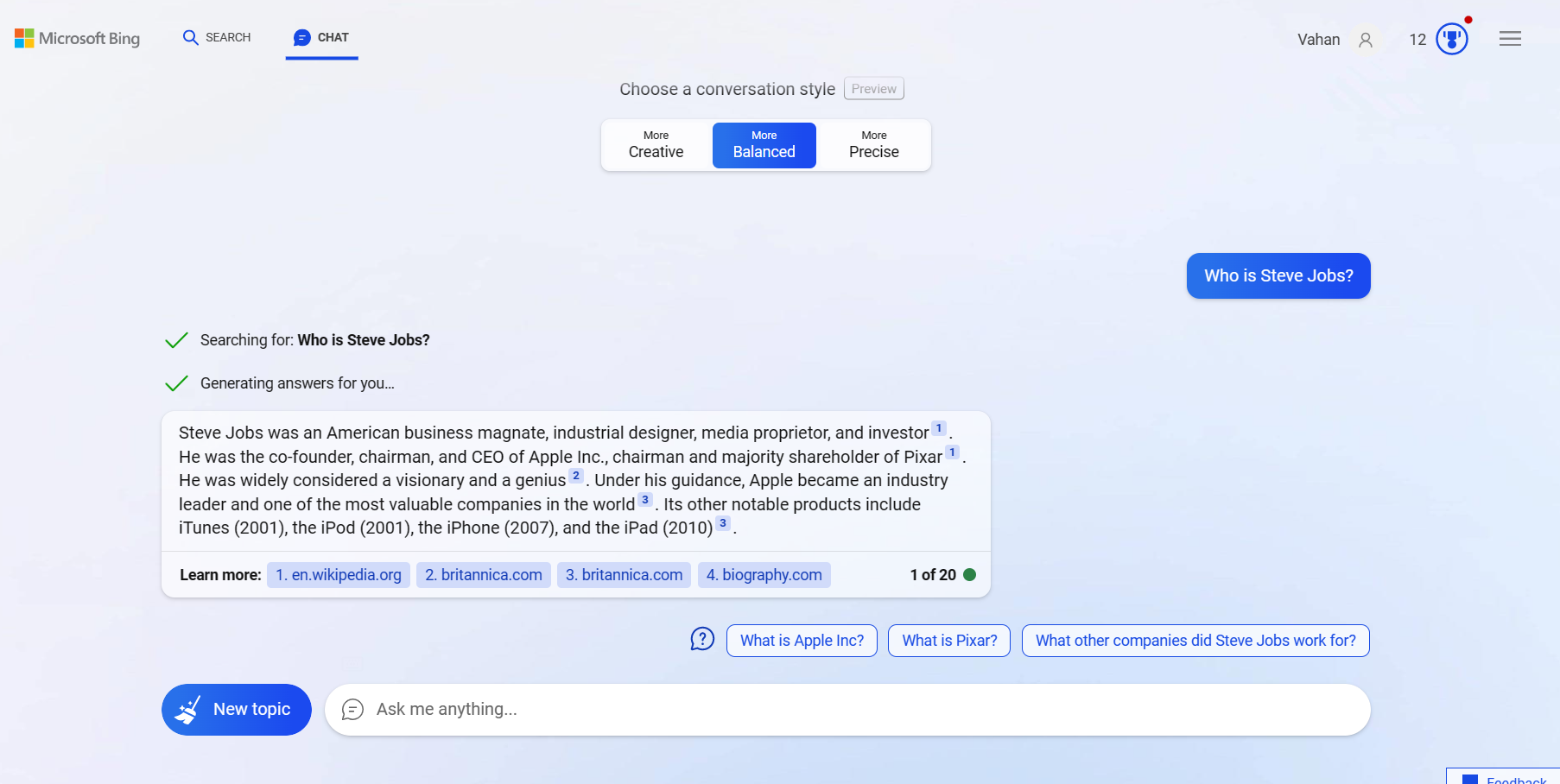 Screenshot from Bing Chat, April 2023
Screenshot from Bing Chat, April 2023
Microsoft Bing’s new chat, codenamed Sydney, is making waves in the AI marketplace.
This just goes to show that Google is not the only one who is working to penetrate the AI market. Microsoft has also introduced an upgraded version of Bing, utilizing an upgraded version of ChatGPT.
Microsoft also claims that this new version is even more accurate and faster than before.
3. Jasper.ai
-
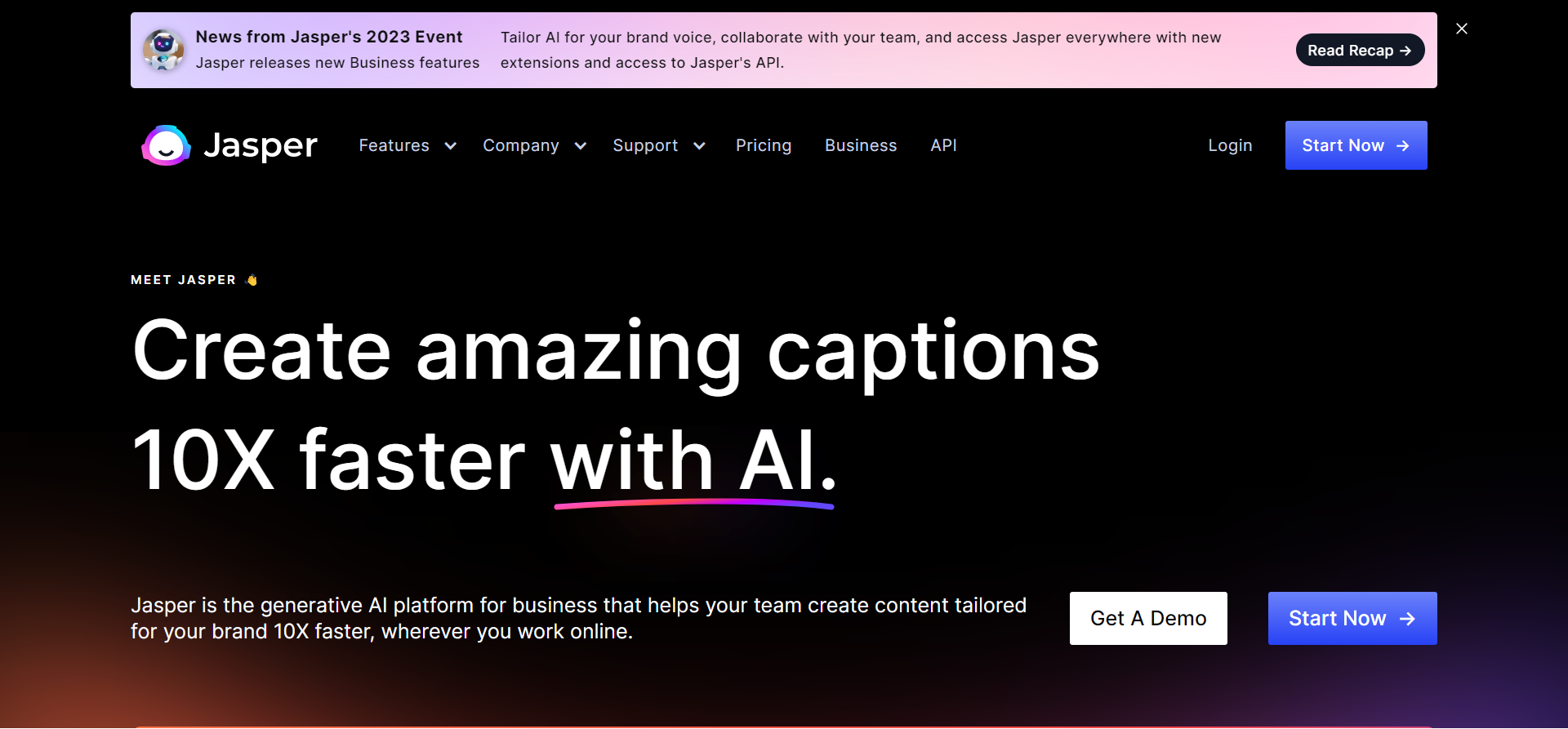 Screenshot from Jasper.ai, April 2023
Screenshot from Jasper.ai, April 2023
Jasper.ai is a conversational AI platform that operates on the cloud and offers powerful natural language understanding (NLU) and dialog management capabilities.
Like ChatGPT, it can provide writing inspiration, support for creating articles, and assist marketing teams in developing effective ad copy and generating images.
Jasper.ai uses Open’s GPT-3.5 in combination with internal NLU models, and it is particularly useful for customer service, sales, and marketing-related tasks.
4. Claude
-
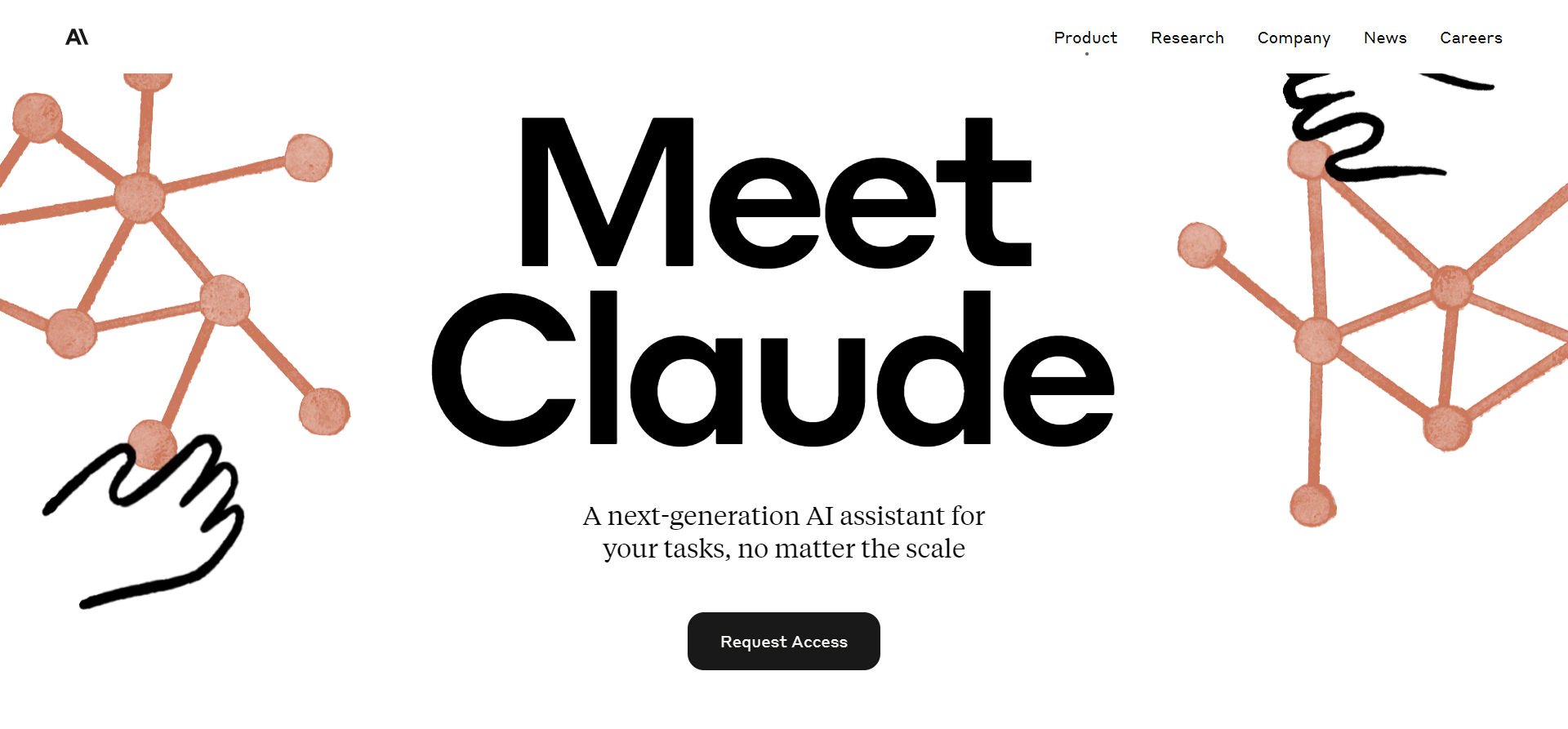 Screenshot from Claude, April 2023
Screenshot from Claude, April 2023
Anthropic has recently launched Claude, which is a next-generation AI assistant capable of performing a wide range of conversational and text-processing tasks.
The development of Claude is based on Anthropic’s research into training AI systems to be helpful, honest, and harmless.
Claude can help with use cases such as summarization, search, creative and collaborative writing, Q&A, coding, and more.
It is available through a chat interface and API in their developer console.
Anthropic offers two versions of Claude: Claude and Claude Instant, with the latter being a lighter, less expensive, and faster option. The company has partnered with several brands, including Quora, Juni Learning, Notion, and DuckDuckGo.
5. ChatSonic
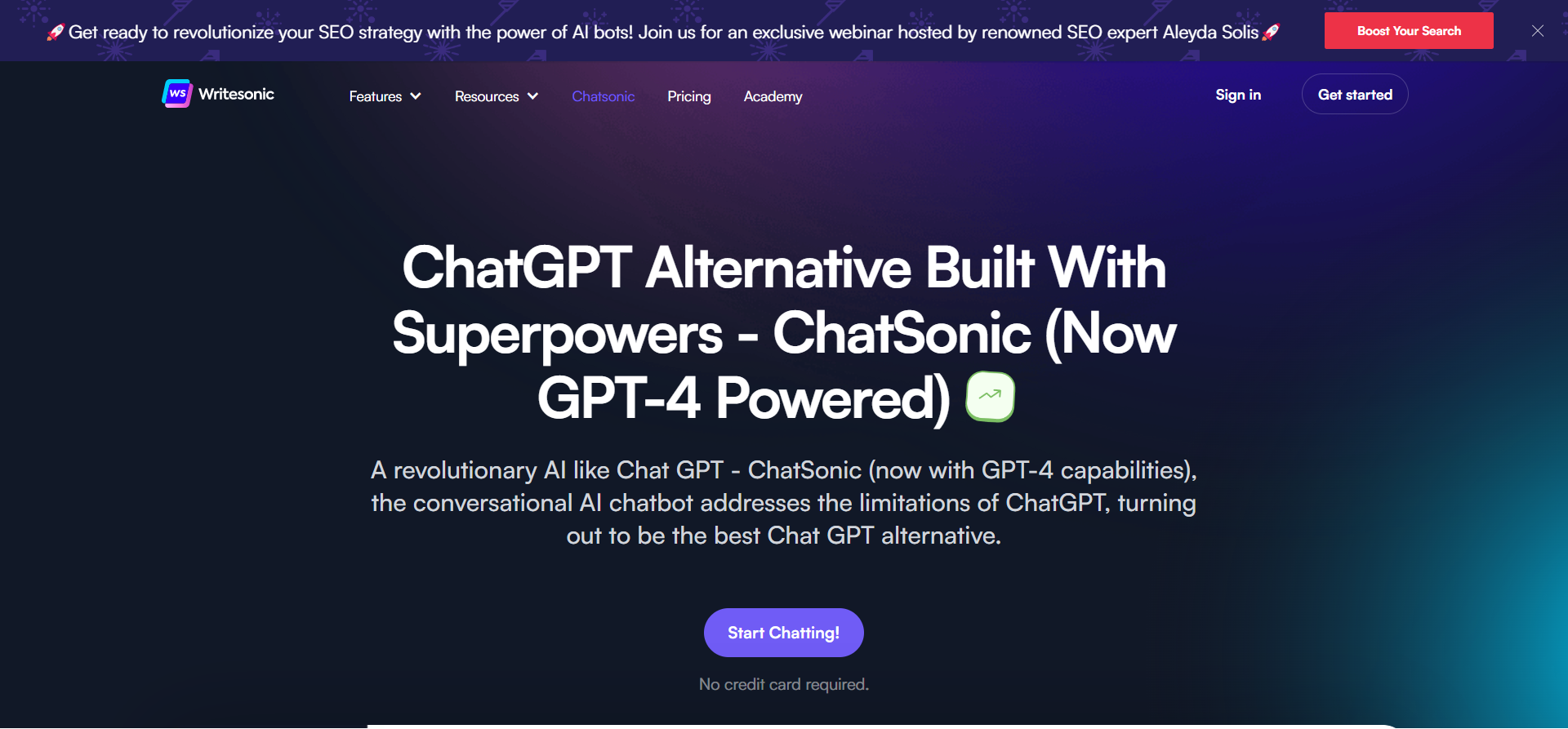 Screenshot from Chatsonic, April 2023
Screenshot from Chatsonic, April 2023ChatSonic is a ChatGPT alternative with factual content-creation capabilities.
Its page claims that it is powered by Google Search, meaning it can help you potentially create content with accurate, factual information about trending topics and current events in real time.
I say “claimed” because ChatGPT is based on Open AI’s GPT-3 language model, which has only been trained on information data sets up to 2021. So it seems that claims like this could be wrong about the capabilities of such applications – unless ChatSonic has introduced a brand new process that processes current information inside its software.
And if not, it is grossly overstating what the application can do.
However, I have not tried this application, so it may have found a way around the limitations of the original GPT-3 language model.
6. NeevaAI
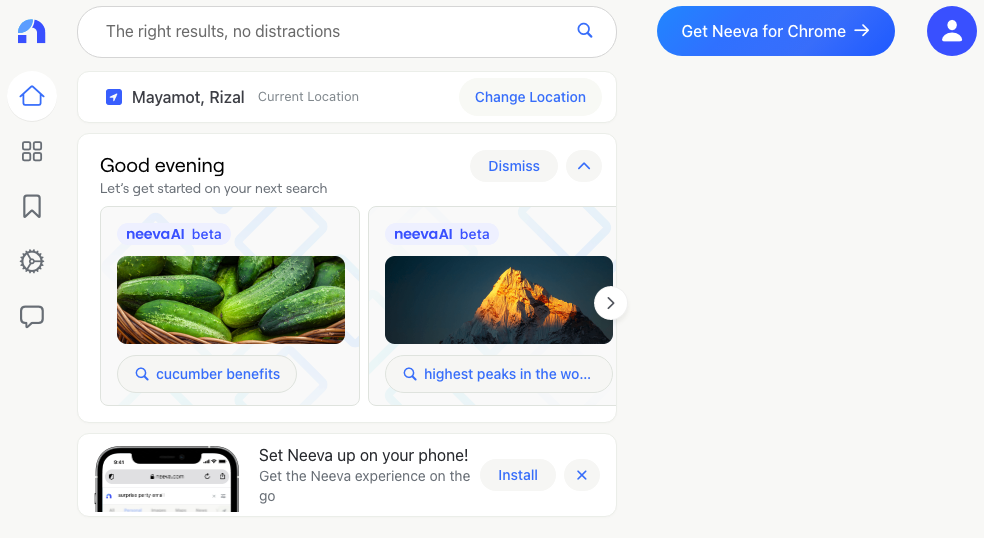 Screenshot from NeevaAI, April 2023
Screenshot from NeevaAI, April 2023As another ChatGPT alternative, NeevaAI is a proprietary search engine that creates a unique experience that merges ChatGPT and other specific language models.
It also enhances the experience with current data and the accuracy and precision provided by the Neeva search engine.
This system has the ability to look through many millions of pages to create a thorough response that’s also appended by sources that are relevant to the project.
The company claims that NeevaAI guarantees a browsing experience that’s free of trackers and ads. It also provides references in the search results, so you can verify the source of the information.
7. YouChat
-
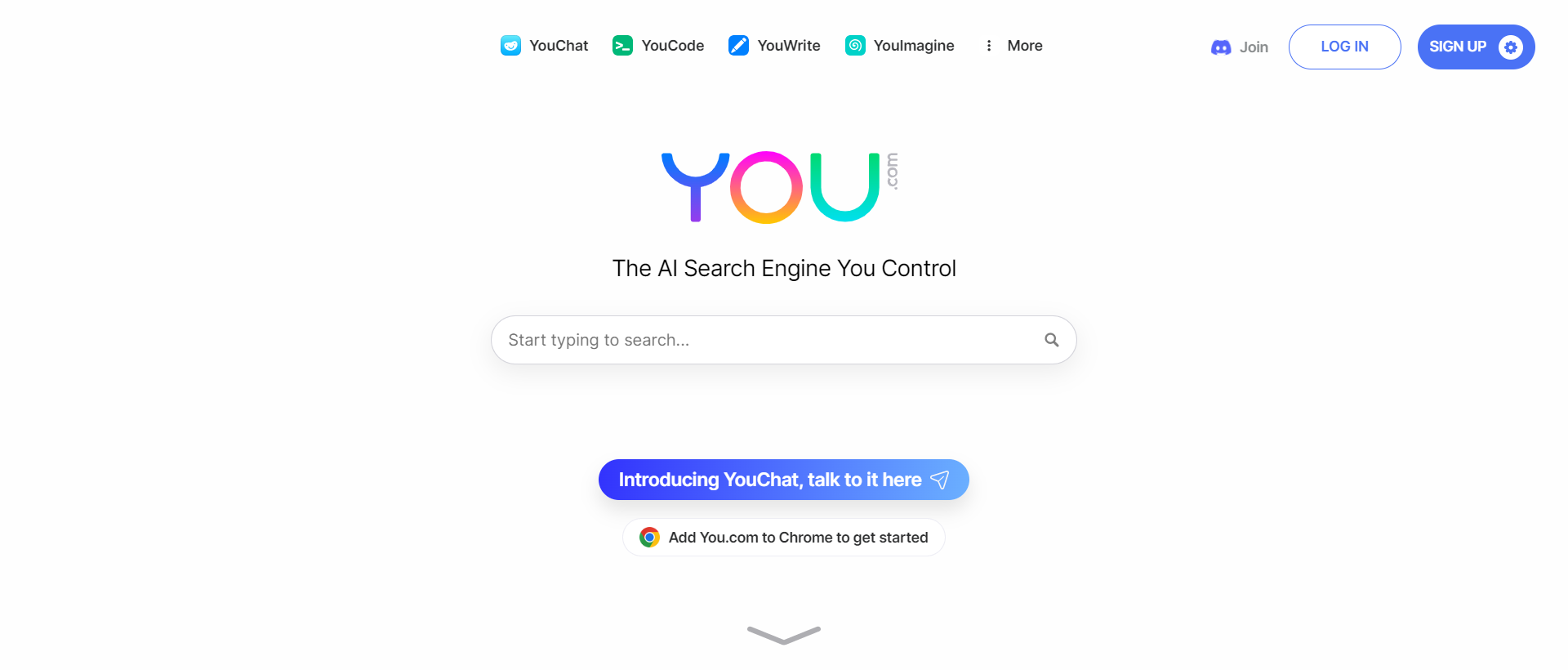 Screenshot from YouChat, April 2023
Screenshot from YouChat, April 2023
You.com has introduced YouChat, an AI search assistant that allows users to have human-like conversations right in their search results.
YouChat is a ChatGPT-like AI assistant that provides real-time data and cites sources to offer increased accuracy and relevance.
With YouChat, users can ask complex questions, solve problems using logical reasoning, learn new languages, and create content in any language.
8. Perplexity
-
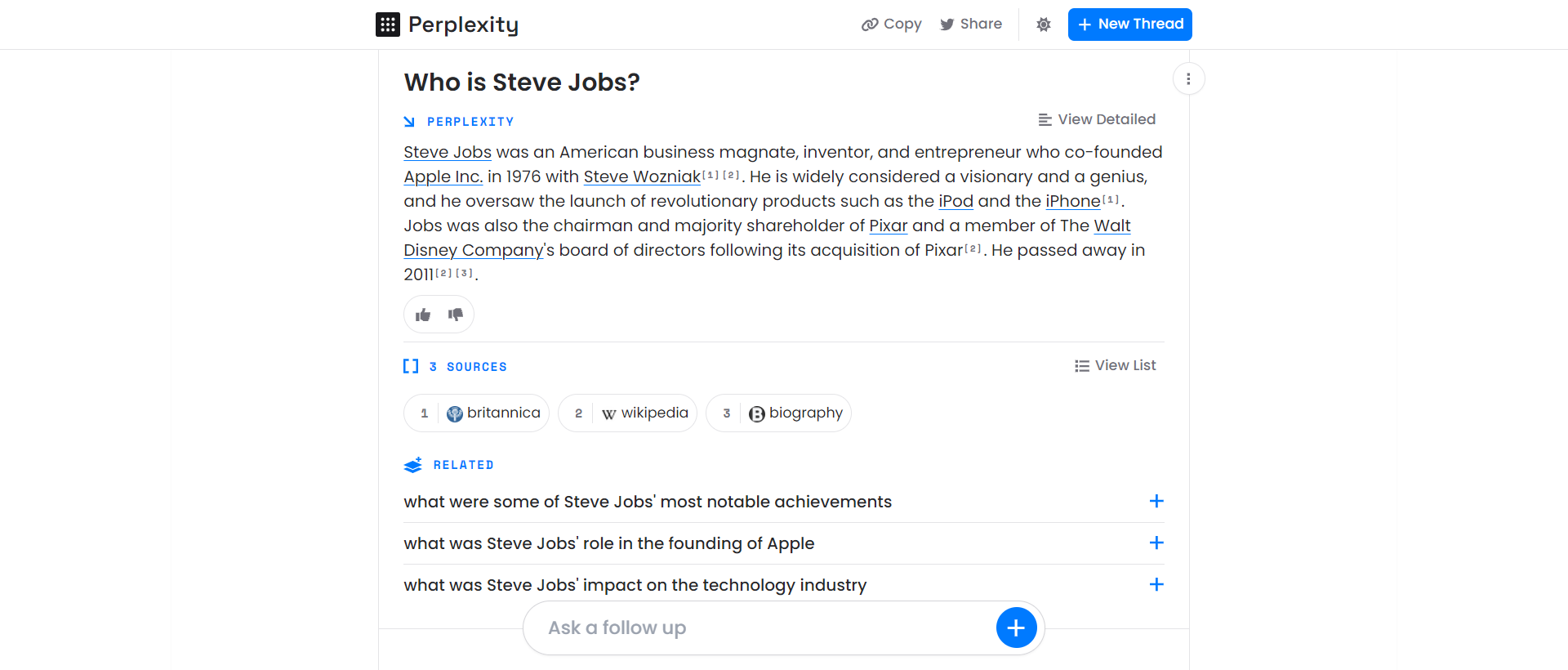 Screenshot from Perplexity, April 2023
Screenshot from Perplexity, April 2023
Perplexity AI’s conversational search engine enables users to get answers to questions on any number of topics.
It uses OpenAI’s GPT-3.5 API and, unlike ChatGPT, responds by citing sites and sources from around the web.
It also offers users follow-up questions to dive deeper into a particular topic.
9. Character.AI
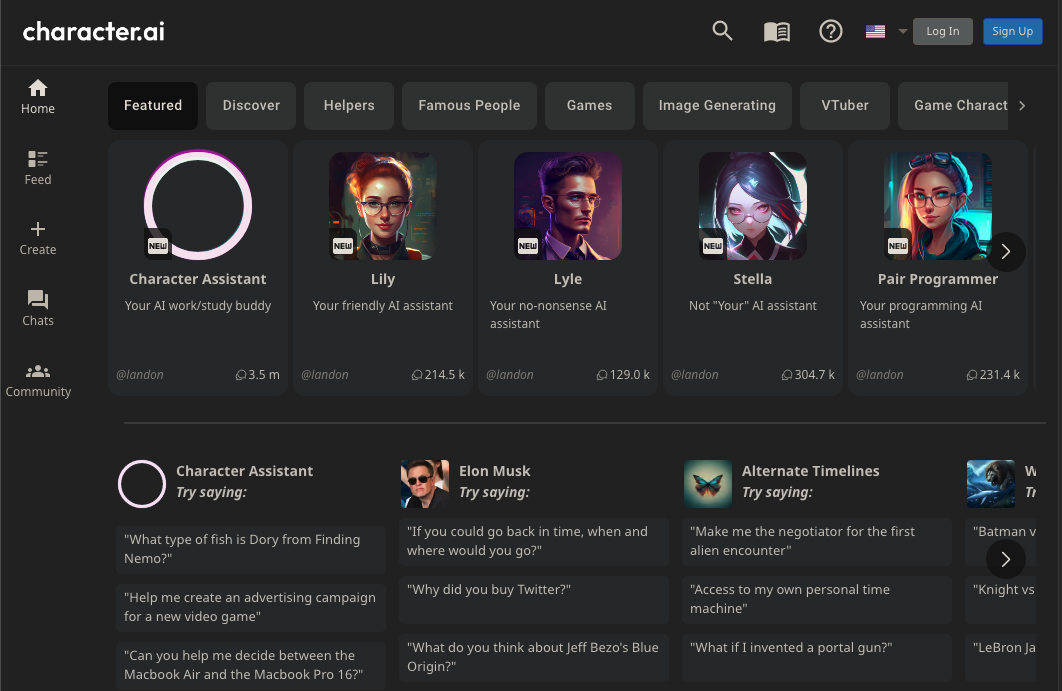 Screenshot from Character.AI, April 2023
Screenshot from Character.AI, April 2023While ChatSonic has a “personas feature” built in, it’s just a feature. With Character.AI, this tool zeroes in on AI personalities entirely to provide chat-like experiences using AI characters.
You can choose from a variety of characters to chat with different types of personalities – from Mario to Tony Stark.
This is akin to the tone of voice feature that is provided in Jasper.ai, but on an entirely different level. It’s also something that’s more for entertainment rather than for real automation value.
Nevertheless, if you’re looking for an AI experience that’s different than what’s currently on the market, this is something you may be interested in.
10. Elicit
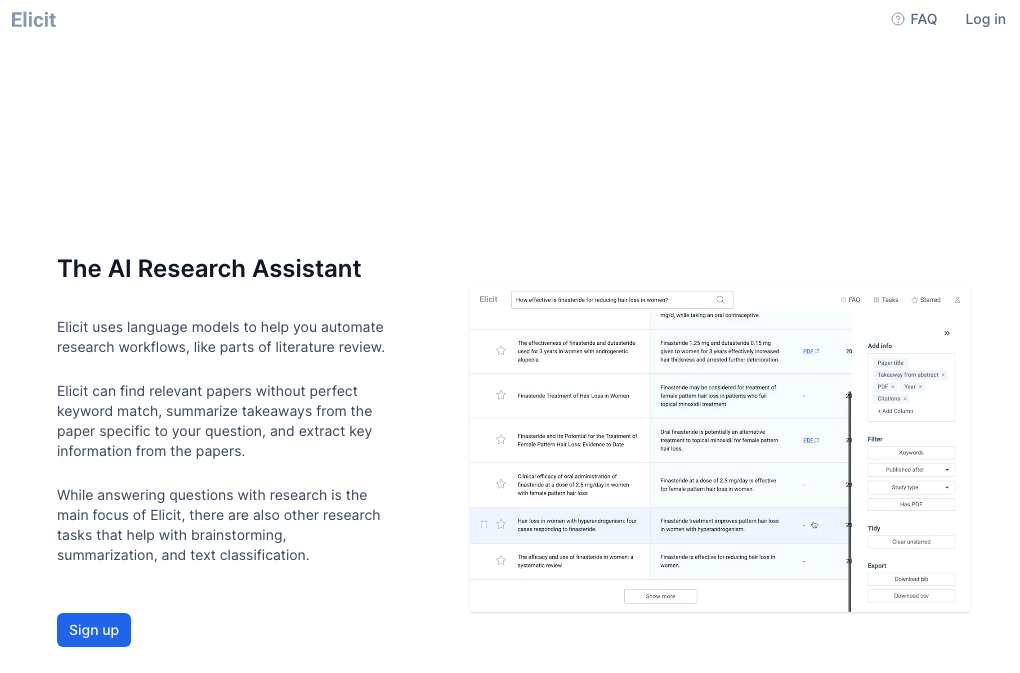 Screenshot from Elicit, April 2023
Screenshot from Elicit, April 2023Elicit is a platform that calls itself an AI research assistant, meaning it can help assist with research and other tasks.
Its primary ability is a feature it calls Literature Review. The way this works is that when you submit a query, Elicit will provide summaries from relevant research papers and documents related to your question.
It’s very efficient in generating helpful summaries of information while prioritizing the veracity and accuracy of the source.
With Elicit, you can access a massive publication collection that is relevant to your query quickly. It also has the ability to answer research questions.
Although an excellent tool for completing research, there are some features that make other ChatGPT alternatives better for updated and more comprehensive research.
11. Learnt.ai
-
 Screenshot from Learnt.ai, April 2023
Screenshot from Learnt.ai, April 2023
Learnt.ai has been specifically created for the needs of education professionals.
Using the GPT language generation model, it can generate human-like text for learning objectives, icebreakers, assessment questions, and more.
It can help with the tedious tasks of manually creating lesson plans, learning objectives, and assessment questions. Automating these processes can help you save valuable time and effort.
The Future of ChatGPT And The AI Marketplace
There are so many wide-ranging applications for the use of ChatGPT that it is impossible to know them all at any given time.
New applications and processes are being released at a lightning pace, leaving creators to wonder if there is an end to the ChatGPT boom.
Some have even heralded the rise of ChatGPT as the end of SEO.
As many times as somebody has claimed that SEO is dead, they have been proven wrong. And this remains true with the arrival of ChatGPT in the marketplace.
While ChatGPT can be used for some things, it cannot replace a real SEO professional. There is still too much analysis and creativity required that a human mind can do, but ChatGPT cannot.
And those who are claiming otherwise are kidding themselves.
First of all, ChatGPT cannot write error-free content without factual errors.
If you’re writing a piece of content for a specific industry that requires specialized knowledge, you must also possess that knowledge yourself so you can verify and check that ChatGPT is actually correct.
ChatGPT cannot create more sophisticated SEO strategies.
ChatGPT cannot come up with a complete response that answers the question, “What happened to my website when the Google update hit last month?” It might create a very rough approximation based on already written articles, but it’s not going to diagnose and figure out that issue for you.
In Conclusion
There are many reasons why ChatGPT is a fantastic tool – and this author loves ChatGPT and what it can do.
I just advise creators to be cautious about more complex topics and make sure that they are not shooting themselves in the foot by relying on ChatGPT too much.
There’s such a thing as too much of a good thing.
We don’t want to get into the practice of relying on ChatGPT only to have it taken away later if regulators decide that’s the best thing to do.
SEO is definitely not dead – and ChatGPT will not be its killer.
But to keep it alive and kicking, SEO pros should stay focused on the details and committed to their work – and don’t rely too much on ChatGPT to get the job done!
More resources:
Featured Image: 13_Phunkod/Shutterstock
SEO
Measuring Content Impact Across The Customer Journey

Understanding the impact of your content at every touchpoint of the customer journey is essential – but that’s easier said than done. From attracting potential leads to nurturing them into loyal customers, there are many touchpoints to look into.
So how do you identify and take advantage of these opportunities for growth?
Watch this on-demand webinar and learn a comprehensive approach for measuring the value of your content initiatives, so you can optimize resource allocation for maximum impact.
You’ll learn:
- Fresh methods for measuring your content’s impact.
- Fascinating insights using first-touch attribution, and how it differs from the usual last-touch perspective.
- Ways to persuade decision-makers to invest in more content by showcasing its value convincingly.
With Bill Franklin and Oliver Tani of DAC Group, we unravel the nuances of attribution modeling, emphasizing the significance of layering first-touch and last-touch attribution within your measurement strategy.
Check out these insights to help you craft compelling content tailored to each stage, using an approach rooted in first-hand experience to ensure your content resonates.
Whether you’re a seasoned marketer or new to content measurement, this webinar promises valuable insights and actionable tactics to elevate your SEO game and optimize your content initiatives for success.
View the slides below or check out the full webinar for all the details.
SEO
How to Find and Use Competitor Keywords

Competitor keywords are the keywords your rivals rank for in Google’s search results. They may rank organically or pay for Google Ads to rank in the paid results.
Knowing your competitors’ keywords is the easiest form of keyword research. If your competitors rank for or target particular keywords, it might be worth it for you to target them, too.
There is no way to see your competitors’ keywords without a tool like Ahrefs, which has a database of keywords and the sites that rank for them. As far as we know, Ahrefs has the biggest database of these keywords.
How to find all the keywords your competitor ranks for
- Go to Ahrefs’ Site Explorer
- Enter your competitor’s domain
- Go to the Organic keywords report
The report is sorted by traffic to show you the keywords sending your competitor the most visits. For example, Mailchimp gets most of its organic traffic from the keyword “mailchimp.”


Since you’re unlikely to rank for your competitor’s brand, you might want to exclude branded keywords from the report. You can do this by adding a Keyword > Doesn’t contain filter. In this example, we’ll filter out keywords containing “mailchimp” or any potential misspellings:


If you’re a new brand competing with one that’s established, you might also want to look for popular low-difficulty keywords. You can do this by setting the Volume filter to a minimum of 500 and the KD filter to a maximum of 10.


How to find keywords your competitor ranks for, but you don’t
- Go to Competitive Analysis
- Enter your domain in the This target doesn’t rank for section
- Enter your competitor’s domain in the But these competitors do section


Hit “Show keyword opportunities,” and you’ll see all the keywords your competitor ranks for, but you don’t.


You can also add a Volume and KD filter to find popular, low-difficulty keywords in this report.


How to find keywords multiple competitors rank for, but you don’t
- Go to Competitive Analysis
- Enter your domain in the This target doesn’t rank for section
- Enter the domains of multiple competitors in the But these competitors do section


You’ll see all the keywords that at least one of these competitors ranks for, but you don’t.


You can also narrow the list down to keywords that all competitors rank for. Click on the Competitors’ positions filter and choose All 3 competitors:


- Go to Ahrefs’ Site Explorer
- Enter your competitor’s domain
- Go to the Paid keywords report


This report shows you the keywords your competitors are targeting via Google Ads.
Since your competitor is paying for traffic from these keywords, it may indicate that they’re profitable for them—and could be for you, too.
You know what keywords your competitors are ranking for or bidding on. But what do you do with them? There are basically three options.
1. Create pages to target these keywords
You can only rank for keywords if you have content about them. So, the most straightforward thing you can do for competitors’ keywords you want to rank for is to create pages to target them.
However, before you do this, it’s worth clustering your competitor’s keywords by Parent Topic. This will group keywords that mean the same or similar things so you can target them all with one page.
Here’s how to do that:
- Export your competitor’s keywords, either from the Organic Keywords or Content Gap report
- Paste them into Keywords Explorer
- Click the “Clusters by Parent Topic” tab


For example, MailChimp ranks for keywords like “what is digital marketing” and “digital marketing definition.” These and many others get clustered under the Parent Topic of “digital marketing” because people searching for them are all looking for the same thing: a definition of digital marketing. You only need to create one page to potentially rank for all these keywords.


2. Optimize existing content by filling subtopics
You don’t always need to create new content to rank for competitors’ keywords. Sometimes, you can optimize the content you already have to rank for them.
How do you know which keywords you can do this for? Try this:
- Export your competitor’s keywords
- Paste them into Keywords Explorer
- Click the “Clusters by Parent Topic” tab
- Look for Parent Topics you already have content about
For example, if we analyze our competitor, we can see that seven keywords they rank for fall under the Parent Topic of “press release template.”


If we search our site, we see that we already have a page about this topic.


If we click the caret and check the keywords in the cluster, we see keywords like “press release example” and “press release format.”


To rank for the keywords in the cluster, we can probably optimize the page we already have by adding sections about the subtopics of “press release examples” and “press release format.”
3. Target these keywords with Google Ads
Paid keywords are the simplest—look through the report and see if there are any relevant keywords you might want to target, too.
For example, Mailchimp is bidding for the keyword “how to create a newsletter.”


If you’re ConvertKit, you may also want to target this keyword since it’s relevant.
If you decide to target the same keyword via Google Ads, you can hover over the magnifying glass to see the ads your competitor is using.


You can also see the landing page your competitor directs ad traffic to under the URL column.


Learn more
Check out more tutorials on how to do competitor keyword analysis:
SEO
Google Confirms Links Are Not That Important

Google’s Gary Illyes confirmed at a recent search marketing conference that Google needs very few links, adding to the growing body of evidence that publishers need to focus on other factors. Gary tweeted confirmation that he indeed say those words.
Background Of Links For Ranking
Links were discovered in the late 1990’s to be a good signal for search engines to use for validating how authoritative a website is and then Google discovered soon after that anchor text could be used to provide semantic signals about what a webpage was about.
One of the most important research papers was Authoritative Sources in a Hyperlinked Environment by Jon M. Kleinberg, published around 1998 (link to research paper at the end of the article). The main discovery of this research paper is that there is too many web pages and there was no objective way to filter search results for quality in order to rank web pages for a subjective idea of relevance.
The author of the research paper discovered that links could be used as an objective filter for authoritativeness.
Kleinberg wrote:
“To provide effective search methods under these conditions, one needs a way to filter, from among a huge collection of relevant pages, a small set of the most “authoritative” or ‘definitive’ ones.”
This is the most influential research paper on links because it kick-started more research on ways to use links beyond as an authority metric but as a subjective metric for relevance.
Objective is something factual. Subjective is something that’s closer to an opinion. The founders of Google discovered how to use the subjective opinions of the Internet as a relevance metric for what to rank in the search results.
What Larry Page and Sergey Brin discovered and shared in their research paper (The Anatomy of a Large-Scale Hypertextual Web Search Engine – link at end of this article) was that it was possible to harness the power of anchor text to determine the subjective opinion of relevance from actual humans. It was essentially crowdsourcing the opinions of millions of website expressed through the link structure between each webpage.
What Did Gary Illyes Say About Links In 2024?
At a recent search conference in Bulgaria, Google’s Gary Illyes made a comment about how Google doesn’t really need that many links and how Google has made links less important.
Patrick Stox tweeted about what he heard at the search conference:
” ‘We need very few links to rank pages… Over the years we’ve made links less important.’ @methode #serpconf2024″
Google’s Gary Illyes tweeted a confirmation of that statement:
“I shouldn’t have said that… I definitely shouldn’t have said that”
Why Links Matter Less
The initial state of anchor text when Google first used links for ranking purposes was absolutely non-spammy, which is why it was so useful. Hyperlinks were primarily used as a way to send traffic from one website to another website.
But by 2004 or 2005 Google was using statistical analysis to detect manipulated links, then around 2004 “powered-by” links in website footers stopped passing anchor text value, and by 2006 links close to the words “advertising” stopped passing link value, links from directories stopped passing ranking value and by 2012 Google deployed a massive link algorithm called Penguin that destroyed the rankings of likely millions of websites, many of which were using guest posting.
The link signal eventually became so bad that Google decided in 2019 to selectively use nofollow links for ranking purposes. Google’s Gary Illyes confirmed that the change to nofollow was made because of the link signal.
Google Explicitly Confirms That Links Matter Less
In 2023 Google’s Gary Illyes shared at a PubCon Austin that links were not even in the top 3 of ranking factors. Then in March 2024, coinciding with the March 2024 Core Algorithm Update, Google updated their spam policies documentation to downplay the importance of links for ranking purposes.
The documentation previously said:
“Google uses links as an important factor in determining the relevancy of web pages.”
The update to the documentation that mentioned links was updated to remove the word important.
Links are not just listed as just another factor:
“Google uses links as a factor in determining the relevancy of web pages.”
At the beginning of April Google’s John Mueller advised that there are more useful SEO activities to engage on than links.
Mueller explained:
“There are more important things for websites nowadays, and over-focusing on links will often result in you wasting your time doing things that don’t make your website better overall”
Finally, Gary Illyes explicitly said that Google needs very few links to rank webpages and confirmed it.
I shouldn’t have said that… I definitely shouldn’t have said that
— Gary 鯨理/경리 Illyes (so official, trust me) (@methode) April 19, 2024
Why Google Doesn’t Need Links
The reason why Google doesn’t need many links is likely because of the extent of AI and natural language undertanding that Google uses in their algorithms. Google must be highly confident in its algorithm to be able to explicitly say that they don’t need it.
Way back when Google implemented the nofollow into the algorithm there were many link builders who sold comment spam links who continued to lie that comment spam still worked. As someone who started link building at the very beginning of modern SEO (I was the moderator of the link building forum at the #1 SEO forum of that time), I can say with confidence that links have stopped playing much of a role in rankings beginning several years ago, which is why I stopped about five or six years ago.
Read the research papers
Authoritative Sources in a Hyperlinked Environment – Jon M. Kleinberg (PDF)
The Anatomy of a Large-Scale Hypertextual Web Search Engine
Featured Image by Shutterstock/RYO Alexandre
-

 PPC4 days ago
PPC4 days ago19 Best SEO Tools in 2024 (For Every Use Case)
-

 MARKETING7 days ago
MARKETING7 days agoWill Google Buy HubSpot? | Content Marketing Institute
-
SEARCHENGINES7 days ago
Daily Search Forum Recap: April 16, 2024
-

 SEO7 days ago
SEO7 days agoGoogle Clarifies Vacation Rental Structured Data
-

 MARKETING6 days ago
MARKETING6 days agoStreamlining Processes for Increased Efficiency and Results
-
SEARCHENGINES6 days ago
Daily Search Forum Recap: April 17, 2024
-

 PPC7 days ago
PPC7 days agoHow to Collect & Use Customer Data the Right (& Ethical) Way
-

 SEO6 days ago
SEO6 days agoAn In-Depth Guide And Best Practices For Mobile SEO















